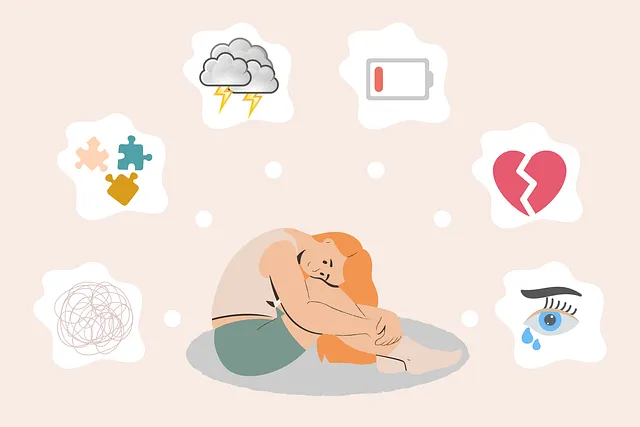Kaiser Permanente behavioral health services Wheat Ridge offers specialized mental wellness group facilitation, creating safe spaces for individuals facing mental health challenges. Facilitators guide groups through conversations and activities aimed at enhancing understanding, building resilience, and promoting healing, with a focus on depression prevention and overall well-being. Through evidence-based practices, interactive sessions, and mindfulness meditation, participants develop coping strategies and cultivate positive mindset shifts. The program prioritizes personalized attention, fostering open dialogue, encouraging peer support, and reducing feelings of isolation, revolutionizing group therapy as a powerful community-driven environment for mental wellness.
Mental wellness group facilitation plays a pivotal role in enhancing collective well-being. This article explores effective techniques and benefits associated with group therapy sessions, inspired by the innovative practices of Kaiser Permanente Behavioral Health Services Wheat Ridge. We delve into strategies that foster safe, supportive environments, encouraging open dialogue and profound personal growth. Understanding these methods is crucial for maximizing the potential of group facilitation in addressing mental health challenges.
- Understanding Mental Wellness Group Facilitation
- Kaiser Permanente Behavioral Health Services Wheat Ridge: An Overview
- Effective Techniques for Group Facilitation
- Benefits and Challenges of Group Therapy Sessions
Understanding Mental Wellness Group Facilitation

Mental wellness group facilitation is a specialized skill set designed to create supportive and safe environments for individuals dealing with various mental health challenges. It involves guiding a group through conversations, activities, and exercises aimed at enhancing understanding, building resilience, and promoting healing. Facilitators play a crucial role in ensuring every member feels heard and valued, fostering open dialogue, and encouraging peer support.
At Kaiser Permanente behavioral health services Wheat Ridge, our community outreach program implementation prioritizes these principles. By facilitating mental wellness groups, we offer a unique space for individuals to connect with others facing similar struggles, reducing feelings of isolation. Our approach focuses not just on managing symptoms but also on depression prevention and overall well-being. Through interactive sessions, facilitators help participants develop coping strategies, cultivate positive mindset shifts, and navigate their mental health journeys effectively.
Kaiser Permanente Behavioral Health Services Wheat Ridge: An Overview

Kaiser Permanente Behavioral Health Services Wheat Ridge stands as a beacon of hope and healing for those seeking support for their mental wellness journey. This facility is renowned for its comprehensive approach to behavioral health, offering a range of services tailored to individual needs. The team at Kaiser Permanente Wheat Ridge is dedicated to empowering individuals with the tools necessary for mood management and coping skills development through evidence-based practices.
Here, compassion cultivation practices play a pivotal role in fostering a supportive environment. By incorporating these techniques, the facility aims to enhance clients’ ability to navigate life’s challenges while cultivating resilience and well-being. With a focus on holistic care, Kaiser Permanente Behavioral Health Services Wheat Ridge ensures that each individual receives personalized attention, promoting long-term mental wellness.
Effective Techniques for Group Facilitation

Effective techniques for group facilitation play a pivotal role in fostering an inclusive and supportive environment at Kaiser Permanente behavioral health services Wheat Ridge. One powerful method is encouraging active participation through open-ended questions, allowing each member to share their unique perspectives and experiences. This approach not only promotes emotional regulation but also strengthens the sense of community within the group. By creating safe spaces for vulnerability and honest communication, facilitators can help individuals develop coping mechanisms tailored to their needs.
Additionally, integrating practices like mindfulness meditation into the group dynamic can significantly enhance mental health outcomes. Mindfulness exercises promote present-moment awareness, helping participants manage stress and anxiety effectively. Incorporating these techniques within the structured framework of Mental Health Education Programs Design ensures a holistic approach to healing and growth. Such inclusive practices have been shown to revolutionize support groups, making them vibrant hubs for personal transformation and collective resilience.
Benefits and Challenges of Group Therapy Sessions

Group therapy sessions offer a unique and powerful environment for individuals seeking mental wellness support. One of the primary benefits is the sense of community it fosters; members gain valuable insights from one another’s experiences, creating a supportive network that enhances individual growth. This peer-to-peer connection can be particularly impactful, as it encourages accountability and provides diverse perspectives on personal challenges. The collaborative nature of group therapy also promotes active participation in one’s healing process, which is essential for sustainable mental wellness according to Kaiser Permanente behavioral health services Wheat Ridge.
However, facilitating effective group therapy comes with its own set of challenges. Maintaining a safe and inclusive space requires careful consideration of risk management planning for mental health professionals, ensuring that all participants feel heard without judgment. Balancing individual needs within a group dynamic can be complex, especially when dealing with sensitive topics. Additionally, the effectiveness of group therapy depends heavily on the skills and approach of the facilitator, highlighting the importance of continuous professional development in this domain, as well as adherence to mental health policy analysis and advocacy practices that uphold ethical standards.
Mental wellness group facilitation plays a pivotal role in enhancing collective well-being, offering a supportive environment through techniques like those employed by Kaiser Permanente Behavioral Health Services Wheat Ridge. By understanding effective methods and navigating potential challenges, facilitators can foster significant benefits for participants. Incorporating diverse strategies ensures engaging sessions that promote healing and personal growth, ultimately enriching mental health support systems.






